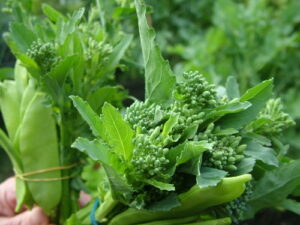My current favourite breakfast – paw paw and citrus fruit salad with homemade yoghurt and toasted pepitas (and a few strawberries to top it off). Paw paw and citrus flavours go so well together, and luckily I have the last citrus of the season – late mandarins and pomelos – still picking.
I hesitated to post this one, but I think it’s good to remember that good food doesn’t need to be complicated. We are picking three or four paw paws a week at the moment, all from one prolific tree – and the creatures are getting one or two as well! I propagated seed from it last year, and I have half a dozen young trees ready to plant out this week. Half of them will be male and only good for the gorgeous flowers, but half are likely to be females.
If you have only ever eaten bought paw paws, you are unlikely to really love this fruit. It is one of the (many) crops that are totally suited to real localvores. Too soft to transport when ripe, commercial crops are picked very green and hard and never develop the sweetness and flavour of tree ripened paw paws.
To love them, you really need to grow your own. Paw paws are a really good garden tree in tropical, subtropical and even warmer temperate climates if you can find the right spot. They won’t cope with frost and they need a long warm summer to bear well, but if you have a north facing fence or wall, you should be able to grow them right into southern NSW. The tree is not too large and it’s really attractive with its large green leaves, so if your front yard faces north, all the better. The roots are not too invasive and won’t dig up paths and pipes.
They’re fast growing and (relatively) short lived. You will get your first crop within a year, but they will only live for 5 or 6 years. If you have limited space, you can go for the bisexual varieties but if you have enough room and are willing to gamble a little on getting females, the sexed kind will bear more heavily and you can easily propagate your own from seed. You will need one male for every half a dozen females.
Other than that, they just like good drainage, a bucket of compost or worm pee a few times a year, and enough water. Chop the tree off if it starts to get too tall, and put a can or icecream bucket over the cut end to stop the hollow trunk filling up with water and rotting. It will sprout several new trunks out the side and gain a new lease on life, at a more pickable level.





Pingback:Early November’s 2 Fruit 5 Veg
Pingback:What I'm On About This Month: Fruitful February - Quitting The Quick Fix